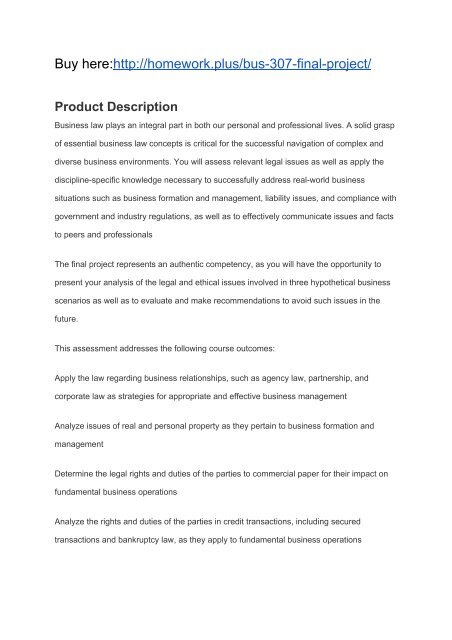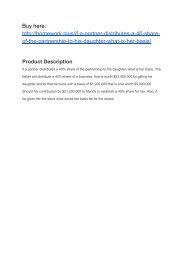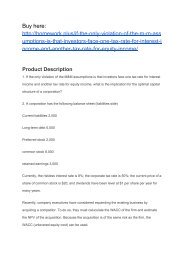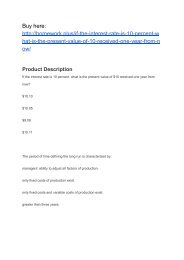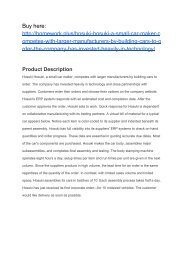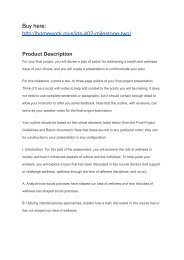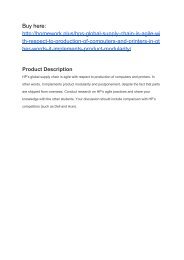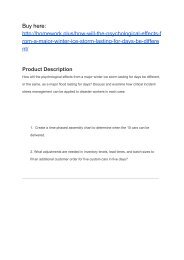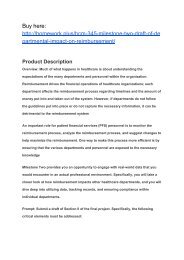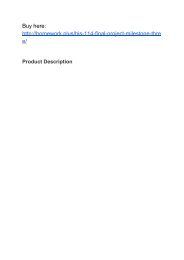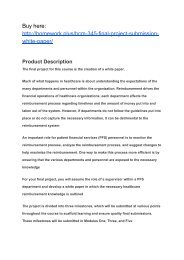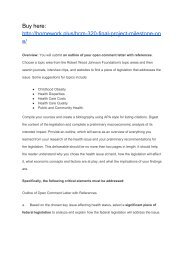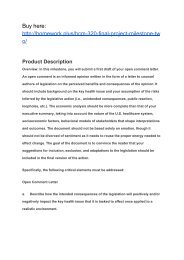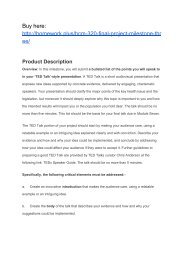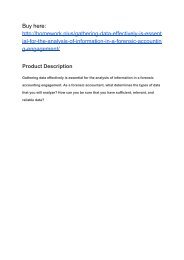BUS 307 Final Project
BUS 307 Final Project
BUS 307 Final Project
You also want an ePaper? Increase the reach of your titles
YUMPU automatically turns print PDFs into web optimized ePapers that Google loves.
Buy here:http://homework.plus/bus-<strong>307</strong>-final-project/<br />
Product Description<br />
Business law plays an integral part in both our personal and professional lives. A solid grasp<br />
of essential business law concepts is critical for the successful navigation of complex and<br />
diverse business environments. You will assess relevant legal issues as well as apply the<br />
discipline-specific knowledge necessary to successfully address real-world business<br />
situations such as business formation and management, liability issues, and compliance with<br />
government and industry regulations, as well as to effectively communicate issues and facts<br />
to peers and professionals<br />
The final project represents an authentic competency, as you will have the opportunity to<br />
present your analysis of the legal and ethical issues involved in three hypothetical business<br />
scenarios as well as to evaluate and make recommendations to avoid such issues in the<br />
future.<br />
This assessment addresses the following course outcomes:<br />
Apply the law regarding business relationships, such as agency law, partnership, and<br />
corporate law as strategies for appropriate and effective business management<br />
Analyze issues of real and personal property as they pertain to business formation and<br />
management<br />
Determine the legal rights and duties of the parties to commercial paper for their impact on<br />
fundamental business operations<br />
Analyze the rights and duties of the parties in credit transactions, including secured<br />
transactions and bankruptcy law, as they apply to fundamental business operations
Evaluate the impact of government regulation on business practices for strategic and<br />
compliance purposes<br />
The final project for this course consists of two milestones and the final project submission.<br />
Milestones One and Two take the form of short answers crafted in email format from the<br />
perspective of a corporate attorney making recommendations to a client. For Case Studies 1<br />
and 2, craft a professional email for each, appropriate in format, tone, and content, to send<br />
to your clients Fred and Sally, with your preliminary thoughts on the issues within. Your<br />
emails should illustrate the issues and relevant law, apply the facts, and support your<br />
conclusions with regard to each issue. Always remember to be clear, kind, and professional<br />
in your communications. The third element, Case Study 3, will be a short, 2–3-page essay in<br />
APA format that will require you to independently issue-spot as well as provide a factual<br />
analysis of relevant law and recommendations. You will receive feedback on both milestones<br />
and the initial element of Case Study 3. Make any necessary revisions and then include<br />
them all in the final submission, where you will label them as Case Study 1, 2, and 3<br />
Case Study 1<br />
Fred is well known in his town for his homeopathic cough syrup. After years of<br />
encouragement, he has decided to take his miracle cough remedy to market as “Fred’s<br />
Miracle Cough Syrup.” While his cough syrup is homeopathic, one of the key ingredients<br />
causes a severe reaction when taken in conjunction with aspirin. Fred plans to make and<br />
bottle his cough syrup in an outbuilding on the family farm. His son, Sam, has been raving to<br />
the locals about his father’s cough syrup for years, and the local drug store and grocer have<br />
contacted Fred to place orders as a result. Sam also intends to approach several national<br />
chains in an effort to secure supply contracts for Fred’s cough syrup. Fred has asked Sam to<br />
assist him with deliveries, as Sam has a van. Fred would like Sam to be involved with the<br />
business as an employee initially, with the option of making him a partial owner at a later<br />
time. Fred and his wife Sally have two children, Sam and Lilly. Both live in cabins on the<br />
family farm with their spouses and children. Fred and Sally engage you as their attorney to
assist with the formation of the new business, including determining the appropriate<br />
business entity type, management issues, product liability issues, and estate planning for<br />
both the business and family property. After your initial meeting, you identify and research<br />
the following issues.<br />
Specifically, the following critical elements must be addressed:<br />
I. Describe the main types of business entities and their defining characteristics.<br />
II. Apply product liability law and determine what issues are present. How would you advise<br />
your client to mitigate those issues?<br />
III. Apply the elements and characteristics of an agency relationship to Sam’s actions. Does<br />
Sam’s involvement prior to the business formation, as well as his anticipated role once the<br />
business is formed, create an agency relationship? Why or why not?<br />
IV. Identify potential real property issues based on the location of the business on the family<br />
farm. Justify each potential issue.<br />
V. Does the manufacture of Fred's Miracle Cough Syrup on the family farm necessitate a<br />
formal transfer of ownership or possessory rights? Defend your response.<br />
VI. Identify potential personal property issues based on the use of Sam’s personal vehicle to<br />
deliver the product. Justify each potential issue.<br />
VII. Does the use of Sam's personal vehicle in the course of business expose Sam or the<br />
business to any liability issues? Defend your response.<br />
VIII. Identify potential estate planning issues with regard to the business and the family farm.<br />
Justify each potential issue.
IX. What estate planning vehicles are available to Fred and Sally should they desire to<br />
transfer ownership in the business and family farm, respectively, to Sam and Lilly equally?<br />
What are the advantages and disadvantages to each?<br />
X. Applying your analysis of the issues above, which type of business entity do you<br />
recommend for Fred’s Miracle Cough Syrup and why?<br />
Case Study 2<br />
Fred’s Miracle Cough Syrup has hit the market and become a huge success with the<br />
burgeoning integrative medicine demographic. Per your advice, Fred has patented his<br />
famous concoction and trademarked the Fred’s Miracle Cough Syrup name and logo.<br />
Demand is so high that Fred and Sally are working full-time on the business. Their children,<br />
Sam and Lilly, and their respective spouses, Jane and Tim, have joined the company<br />
full-time as well. In fact, Fred and Sally have made Sam and Lilly part owners of the<br />
business. Fred, Sam, and Tim handle the production, sales, and delivery. Sally and Lilly<br />
handle the majority of the administrative and business management tasks, while Jane acts<br />
as the bookkeeper. Sally and Fred are the only authorized signatories on the corporate<br />
account<br />
Sally and Lilly have been hard at work securing a new production facility and distribution<br />
chain to accommodate an upcoming contract with a national chain. After locating a large<br />
warehouse on several acres, Sally and Lilly approach their local credit union for a loan. The<br />
business has only one business credit card used to purchase supplies for the production of<br />
Fred’s Miracle Cough Syrup, and there is a small mortgage outstanding on the family farm.<br />
Personal debts of the individual family members consist of small credit-card balances for<br />
Fred, Sally, Sam, and Lilly as well as an auto loan on Sam’s van<br />
During the commercial loan accounting review process, Sally and Lilly discover that Jane<br />
has been siphoning off large amounts of corporate money and “cooking the books” to hide
her actions. Jane has written several checks from the corporate account and forged both<br />
Sally’s and Fred’s signatures. Jane has made out all but one of the forged checks to Don, a<br />
local loan shark, in an effort to repay her gambling debts. The check Jane did not deliver to<br />
Don was made out to “Cash,” which she slipped into the collection box at church in an effort<br />
to absolve her guilt. The embezzlement was so severe that the family fears that Fred’s<br />
Miracle Cough Syrup is now on the brink of bankruptcy. Meanwhile, Sam’s refusal to enter<br />
into an exclusive distribution deal with the local drugstore has enraged Bob, the owner. Bob<br />
has now reverse engineered Fred’s cough syrup recipe and has posted it online in an act of<br />
vengeance<br />
As Fred and Sally tearfully recount the events of the past month, you reassure them that you<br />
are on the case, and you begin to ponder the legal issues at hand.<br />
Specifically, the following critical elements must be addressed:<br />
I. What legal defenses might Fred and Sally raise with regard to the checks written by Jane<br />
to Don? Why do you believe they will be successful or unsuccessful?<br />
II. What legal defenses might Fred and Sally raise with regard to the check written by Jane<br />
and delivered to the church? Why do you believe they will be successful or unsuccessful?<br />
III. What, if any, civil claims do Fred and Sally have against Jane based on her actions? Why<br />
do you believe they will be successful or unsuccessful?<br />
IV. Analyze the forms of bankruptcy available to the business in this instance (assume the<br />
business entity is the same form as you chose in Case Study 1). What form is most<br />
appropriate and why?<br />
V. Analyze the implications of a potential bankruptcy action on the business assets (assume<br />
the business entity is the same form as you chose in Case Study 1). Explain which, if any,<br />
are subject to forced sales, liens, or forfeiture.
VI. Analyze the implications, if any, of a potential bankruptcy action by the business on the<br />
assets of the individual family members (assume the business entity is the same form as you<br />
chose in Case Study 1). Explain if the assets of business owners are subject to forced sale,<br />
liens, or forfeiture.<br />
VII. What legal recourse does Fred have against Bob for infringement of intellectual property<br />
rights? Do you believe he will be successful? Why or why not?<br />
Case Study 3<br />
Both Fred’s family and the business have rebounded from their prior issues. Jane sought<br />
counseling for her gambling issues and has worked hard to mend her relationships with the<br />
family. Prior to cashing the forged checks from Jane, Don was struck by lightning and<br />
experienced a spiritual enlightenment. He willingly returned the checks to Fred and Sally and<br />
promptly joined the Peace Corps. Likewise, when the church found out the donated check<br />
was a forgery, it was immediately returned. Bob’s wife (also Sally’s best friend) found out<br />
about Bob’s online sabotage and promptly remedied the situation. Once Fred’s Miracle<br />
Cough Syrup was back on track, the company’s growth was exponential. Featured on a<br />
widely viewed talk show starring a prominent doctor, online orders and demands from<br />
big-box chains nationwide skyrocketed. Fred and Sally have been told that now would be an<br />
ideal time to take Fred’s Miracle Cough Syrup public. The only distressing issue at hand<br />
involves Tammy, a local girl who had been working as a delivery girl for the company. She<br />
applied for Jane’s former job as bookkeeper. Fred and Sally hired Ted, an experienced<br />
accountant, instead, and Tammy has filed a claim of sex discrimination against the company<br />
and Fred personally. Fred and Sally are seeking your advice regarding Tammy and the<br />
possibility of taking the company public


